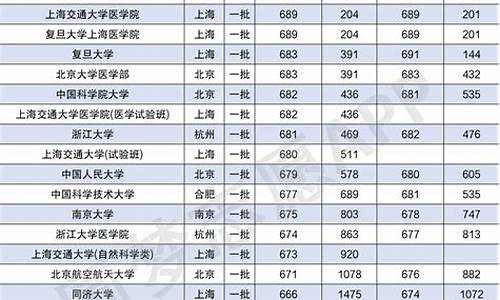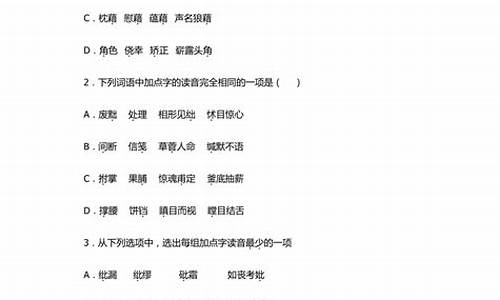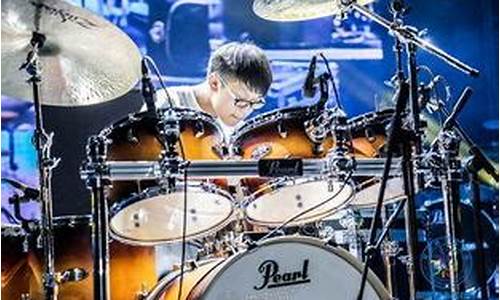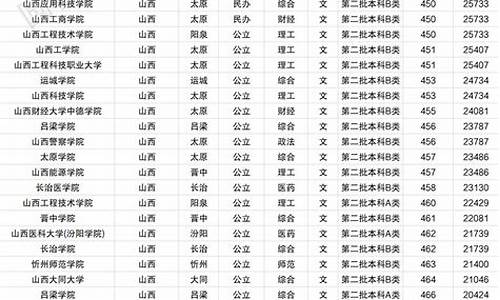您现在的位置是: 首页 > 教育资讯 教育资讯
高考英语语法填空大小写错误扣分吗,高考英语语法2017
tamoadmin 2024-05-14 人已围观
简介1.2017年中考英语语法大全:定语从句2017年天津高考英语试卷整体难度适中,语法填空考查的知识点非常简单,第四篇阅读和完形填空个别题难度较大,加大了区分度,凸显了选拔人才的目的。总的来说,217年天津市高考英语试卷对考生的基础知识、逻辑思考能力、推理判断能力及表达能力各方面都进行了考查。2017年中考英语语法大全:定语从句专题七 情态动词、系动词 在英语中,表示主语动作或状态的词就叫做动词。
1.2017年中考英语语法大全:定语从句

2017年天津高考英语试卷整体难度适中,语法填空考查的知识点非常简单,第四篇阅读和完形填空个别题难度较大,加大了区分度,凸显了选拔人才的目的。
总的来说,217年天津市高考英语试卷对考生的基础知识、逻辑思考能力、推理判断能力及表达能力各方面都进行了考查。
2017年中考英语语法大全:定语从句
专题七 情态动词、系动词
在英语中,表示主语动作或状态的词就叫做动词。根据动词的意义及在句子中的作用,可将动词分为实义动词(v)、系动词(link-v)、情态动词(modal verb)和助动词(v. aux)四种类型。
下面我们就来看看情态动词和系动词的具体用法。
一、情态动词
情态动词本身有一定的意义,但不能独立作谓语,要和动词原形一起构成谓语,表说话人的语气和态度。它没有人称和数的变化。常见的情态动词有:
1. can表示能力,有“能”“会”的意思;表示可能性,多用在否定或疑问句中;表示请求和许可。
如:The parrot can speak three languages. 这只鹦鹉能讲三种语言。
Can I borrow the book from the library?我可以从图书棺借这本书吗?
Shanghai can be very cold in March. 上海三月份可能会很冷。
拓展延伸can还有过去式could 可表“能,会”,又可以和be able to替换,而be able to有 更多时态。 如:
He could swim when he was four. =He was able to swim when he was four. 他四岁时就会游泳。 在一般疑问句中,can/could 常用来表示请求或征求对方意见,用could 比用can语气更加委婉和客气。类似用法的还有Will /Would you (please)…等句型。
如:Could you tell me how I can get to the post office? 你能告诉我怎样到邮局吗? Would you please turn up the radio?请你把收音机开大点,好吗?
2.may表示“许可”时,相当于can,其否定回答用can’t/mustn’t;表推测时,常用在肯定句中,表“可能”。
如:-May I borrow your ruler?我可以借用您的直尺吗?
-No, you can't /mustn't. 不行。
She may be a teacher. 她可能是一名教师。
拓展延伸may可表示祝愿。如: May you succeed! 祝你成功!
3.must表示“必须;必要”,以“must”开头的一般疑问句其肯定回答用“must”,否定回答用“needn't”或“don't have to”。 must表推测时,常用在肯定句中,是“一定”的意思,其否定形式mustn ' t表“禁止”的意思。
如:-Must I leave now?现在我必须离开吗?
-No,you needn't /you don't have to. 没有必要。
This book must be Lucy's . Look! Her name is on the book cover. 这本书是露西的。看!封面上还有她的名字。
You mustn't draw on the wall. 你不准在墙上画画。
拓展延伸must表示说话人的主观看法,只有一般现在时;have to强调客观要求,有时态、人称和数的变化。如: My mother is ill. I have to look after her now. 妈妈病了,我得去照看她。
4.need作情态动词时,常用在否定和疑问句中,表示“需要;要”的意思。
如:Need we finish the work now?现在我们需要完成这项工作吗?
They needn ' t look after him. 他们不需要照顾他了。
拓展延伸need还可以用作行为动词,可以用于各种句型。如:
Does he need any help? 他需要帮助吗?
The desk needs repairing. 这张桌子需要修理。
5.shall 用于第一人称,表示说话人征求对方意见,过去式为should;will 用手第二人称的疑问句中,表示说话人向对方提出请求和建议,过去式为would。
如:Shall I go shopping with you?'我可以同你去购物吗?
I don't know what I should do next. 我不知道下一步该干什么。
Would you please come a little earlier?请你来早一点好吗?
6.情态动词had better的用法
(1)had better 后接动词原形,表劝告、建议,意为“”。“You'd better… ”含有强制命令的语气,对长辈不宜使用。
如:You'd better ask that policeman over there. 你问一下那边的那个警察。
(2)慎用had better! 注意以下四条:
①had better表达的是说话者强硬性的建议,告诫别人(包括自己)如何做。 如:Granny, the hospital is not very near. We'd better catch a bus. 奶奶,医院不是很近。我们坐公共汽车。
②had better不用于礼貌的请求或征询,它隐含一种警告或威胁。 如:You ' d better finish the work today and bring it tomorrow. 你今天就把作业完成,明天带来。
③had better意思接近should,但它除了表示语气强硬以外,还表示马上要去做的事情,比should更紧迫。 如:You’d better see a doctor at once. 你马上去看医生。
④had better不含比较的意思,该结构表示“It would be good to… ”,而不是“It would be better to…”。
二、系动词
系动词有实际意义,但不能单独做谓语,必须与表语一起构成句子的谓语,说明主语的性质、状态或身份等。 它分为完全系动词和不完全系动词。
1.完全系动词(be)可接名词、代词、形容词、副词、介词短语、非谓语动词短语、句子做表语。如: I'm a student. 我是个学生。(名词) He is fine. 他很好。(形容词) It is me. 是我。(代词) Are you there?你在那儿吗?(副词) She is at school. 她在学校读书。(介词短语) He is to come soon. 他过会儿该来了。(不定式) My job is teaching English. 我的工作是教英语。(动词的ing形式) My idea is that we will start now. 我的想法是我们现在就开始。(句子)
2.不完全系动词 (get,turn,feel,smell,look,sound,taste)一般只接形容词做表语。如:When spring comes, it gets warmer and warmer.
春天来了,天气变得越来越暖和了。 Food may go bad soon if it is not put into a fridge.
食物如果不放进冰箱里就会很快变坏。 My brother became / turned a teacher after his graduation.
我哥哥毕业后就当上了老师。(注意become和turn的用法区别)
实战演练(2×50) 计分:
1. --Mary, ____ you speak Chinese? -- Yes, but only a little.
A. will B. can C. could
2. --Must I do the work now? -- No, you ____. You can do it later.
A. can't B. mustn't C. needn’t
3. -- I can't stop smoking, doctor. -- For your health, I'm afraid you ____.
A. can B. need C. must
4. -- Whose book is it? -- It ____ be Bob's sister's. She is only a baby.
A. must B. mustn't C. can't
5. -- Jill looks so painful, there ____ be something wrong with her.
-- Oh, dear! We'd better take her to the hospital at once.
A. can B. should C. must
6. --Is Simon coming by train? -- He should, but he ____ not. He likes driving his car.
A. may B. need C. must
7. -- May I try on the jeans? -- Yes, you ___.
A. should B. can C. must
8. -- Do you know any traffic rules?
-- A little. When the traffic lights are red, we ____ stop and wait.
A. may B. can C. must
9. I think schools ____ allow students at least one hour a day for sports.
A. would B. should C. could
10. -- Can I swim in the lake. Dad?
-- No, you ____. Haven't you seen the notice “No Swimming”?
A. may not B. mightn't C. mustn't
11. -- Are you going to Beijing by air?
-- It's fast but a little expensive. So I am not sure. I __ take it.
A. will B. may C. must
12. -- Could I borrow your dictionary? -- Of course you ____.
A. can B. will C. should
13. --Don't forget to come to my birthday party tomorrow. --No,____.
A. I don't B. I won't C. I can't
14. -- Will you please stay here for the party?
-- Sorry, I ____. I'll have to go to an important meeting.
A. mustn't B. needn't C. can't
15. -- Must I tidy the room now?
-- No, you ____. You can do it after breakfast.
A. mustn’t B. need C. don't have to
16. -- You must come back every month. -- Yes, I ____.
A. will B. must C. should
17. -- Is this coat Jane's? -- It ____ be hers, but I'm not sure.
A. will B. may C. must
18. -- ____ we go and fly kites today? -- That's a good idea.
A. Should B. Must C. Shall
19. --ls your brother playing computer games, Ted?
-- He ___ do that because the computer doesn't work.
A. may not B. can't C. mustn't
20. -- I don't mind telling you what I have known.
-- You ___, and I am not asking you for it.
A. needn't B. mustn't C. may not
21. _____ you help me?
A.Will B.Shall C.Must
22. You ______watch TV if you’ve finished your homework.
A. can B. must C. need
23. I have seen lights in that empty house. Do you think I _____report it to the police?
A. should B. may C. will
24. -- Who is the girl standing over there?
-- Well, if you ______know, her name is Mary.
A. may B. can C. must
25. -- Excuse me, could you tell me where the supermarket is?
-- It’s two blocks straight ahead. You _____miss it.
A. mustn’t B. can’t C. shouldn’t
26. -- Mom, there goes the bell.
-- Oh, it _____ Annie. I invited her to come for dinner.
A. can’t be B. must be C. may be
27. I’ll let you see the patient in an hour if you _____wait here.
A. will B. must C. can
28. Whoever can answer one of my questions ______get a prize.
A. would B. should C. will
29. Tom, you ______leave all your clothes on the floor like this.
A. wouldn’t B. mustn’t C. needn’t
30. It’s 7:50. You ____hurry, or you’ll be late.
A. might B. will C. had better
31. In spring, all the flowers in the garden _______ sweet.
A. taste B. smell C. become
32. She _______ like her mother in character.
A. is B. seems C. looks
33. In late autumn leaves _______ brown.
A. get B. turn C. come
34. Look! There _______ so many people here on vacation.
A. have B. are C. be
35. His classmate_______ a singer.
A. were B. grew C. has become
36. My job is ______ you math.
A. to teach B. teaches C. taught
37. How time flies! Three years _______ really a short time.
A. are B. is C. was
38. It sounds _______ a good idea.
A. as B. is C. like
39. Her temperature _______ to be all right.
A. seems B. sounds C. looks
40. His wish to become a driver has _______ true.
A. turned B. come C. been
41. Little Jim’s speech sounds _______.
A. friendly B. wonderfully C. nicely
42. When her mother came home yesterday, it was _______ dark.
A. going B. running C. getting
43. These apples taste _______.
A. to be good B. good C. well
44. -- How about the cloth you bought yesterday?
-- That’s very beautiful. It _______ so soft.
A. felt B. feels C. is feeling
45. When his brother telephoned him last night, he _______ asleep.
A. felt B. fell C. fall
46. The food will _______ bad easily in such hot weather.
A. go B. went C. turn
47. It _______ that he was late for the train.
A. looks B. says C.seems
48. What does your brother look _______?
A. like B. as C. after
49. The girl’s voice is so sweet and her songs _______ very beautiful.
A. taste B. look C. sound
50. What a lovely day! I hope it _______ fine.
A. stayed B. will stay C. will get
参考答案
1-5BCCCC 6-10ABCBC 11-15BABCC 16-20ABCBA 21-25AAACB
26-30BACBC 31-35BABBC 36-40ABCAB 41-45ACBBB 46-50ACACB
定语从句
1在复合句中做定语的从句称为定语从句,它可以用来修饰名词或代词。被定语从句修饰的名词或代词叫先行词。定语从句必须放在先行词后面。
2引导定语从句的词通常被称为关系词。关系词一般位于先行词与定语从句之间,且作为定语从句的一个成分。关系词又分为关系代词和关系副词。
I 关系代词引导的定语从句
关系代词所代替的先行词是人或物的名词或代词,并在句中充当主语、宾语、定语等成分。关系代词在定语从句中作主语时,从句谓语动词的人称和数要和先行词保持一致。
1)who, whom, that
这些词代替的先行词是人的名词或代词,在从句中作主语和宾语。例如:
Is he the man who/that wants to see you? 他就是你想见的人吗?(who/that在从句中作主语)
He is the man whom/ that I saw yesterday. 他就是我昨天见的那个人。(whom/that在从句中作宾语)
2) whose 用来指人或物,(只用作定语, 若指物,它还可以同of which互换)。例如:
They rushed over to help the man whose car had broken down. 那人车坏了,大家都跑过去帮忙。
Please pass me the book whose (of which) cover is green. 请递给我那本绿皮的书。
3)which, that所代替的先行词是事物的名词或代词,在从句中可作主语、宾语等。例如:
A prosperity which / that had never been seen before appears in the countryside.
农村出现了前所未有的繁荣。(which / that在句中作宾语)
The package (which / that)you are carrying is about to come unwrapped. 你拿的包快散了。(which / that在句中作宾语)
II. 关系副词引导的定语从句
关系副词可代替的先行词是时间、地点或理由的名词,在从句中作状语。
1) 关系副词when, where, why的含义相当于"介词+ which"结构,因此常常和"介词+ which"结构交替使用。例如:
I will never forget the day when I met her. 我将永远不会忘记我见到她的那一天
Beijing is the place where(in which) I was born. 北京是我的出生地。
Is this the reason why (for which) he refused our offer? 这就是他拒绝我们帮助他的理由吗?
2)that代替关系副词,可以用于表示时间、地点、方式、理由的名词后取代when, where, why和"介词+ which"引导的定语从句,在口语中that常被省略。例如:
His father died the year (that / when / in which) he was born. 他父亲在他出生那年逝世了。
He is unlikely to find the place (that / where / in which) he lived forty years ago. 他不大可能找到他四十年前居住过的地方。
III.判断关系代词与关系副词
方法一: 用关系代词,还是关系副词完全取决于从句中的谓语动词。及物动词后面无宾语,就必须要求用关系代词;而不及物动词则要求用关系副词。例如:
This is the mountain village where I stayed last year. 这是我去年呆过的山村。
I'll never forget the days when I worked together with you.我永远不会忘记与你共事的日子。
判断改错:
(错) This is the mountain village where I visited last year.
(错) I will never forget the days when I spent in the countryside.
(对) This is the mountain village (which) I visited last year.
(对) I'll never forget the days (which) I spent in the countryside.
习惯上总把表地点或时间的名词与关系副词 where, when联系在一起。此两题错在关系词的误用上。
方法二: 准确判断先行词在定语从句中的成分(主、谓、宾、定、状),也能正确选择出关系代词/关系副词。
例1. Is this museum ___ you visited a few days age?
A. where B. that C. on which D. the one
例2. Is this the museum ____ the exhibition was held.
A. where B. that C. on which D. the one
答案:例1 D,例2 A
例1变为肯定句: This museum is ___ you visited a few days ago.
例2变为肯定句: This is the museum ___ the exhibition was held.
在句1中,所缺部分为宾语,而where, that, on which都不能起到宾语的作用,只有the one既做了主句的表语,又可做从句的宾语,可以省略关系代词,所以应选D。
而句2中, 主、谓、宾俱全,从句部分为句子的状语表地点,既可用副词where,又因 in the museum词组,可用介词in + which 引导地点状语。而此题中,介词on 用的不对,所以选A。
关系词的选择依据在从句中所做的成分,先行词在从句中做主、定、宾语时,选择关系代词(who, whom, that, which, whose); 先行词在从句中做状语时,应选择关系副词 ( where 地点状语,when 时间状语,why 原因状语) 。
IV. 限制性和非限制性定语从句
1) 定语从句有限制性和非限制性两种。限制性定语从句是先行词不可缺少的部分,去掉它主句意思往往不明确;非限制性定语从句是先行词的附加说明,去掉了也不会影响主句的意思,它与主句之间通常用逗号分开。例如:
This is the house which we bought last month. 这是我们上个月买的那幢房子。(限制性)
The house, which we bought last month, is very nice.这幢房子很漂亮,是我们上个月买的。(非限制性)
2) 当先行词是专有名词或物主代词和指示代词所修饰时,其后的定语从句通常是非限制性的。例如:
Charles Smith, who was my former teacher, retired last year. 查理?史密斯去年退休了,他曾经是我的老师。
My house, which I bought last year, has got a lovely garden. 我去年买的的那幢房子带着个漂亮的花园。
This novel, which I have read three times, is very touching. 这本小说很动人,我已经读了三遍。
3) 非限制性定语从句还能将整个主句作为先行词, 对其进行修饰, 这时从句谓语动词要用第三人称单数。例如:
He seems not to have grasped what I meant, which greatly upsets me. 他似乎没抓住我的意思,这使我心烦。
Liquid water changes to vapor, which is called evaporation. 液态水变为蒸汽,这就叫做蒸发。
说明:关系代词that和关系副词why不能引导非限制性定语从句。
V. 介词+关系词
1)介词后面的关系词不能省略。
2)that前不能有介词。
3)某些在从句中充当时间,地点或原因状语的"介词+关系词"结构可以同关系副词when 和where 互换。例如:
This is the house in which I lived two years ago. 这是我两年前住过的房子。
This is the house where I lived two years ago.
Do you remember the day on which you joined our club? 还记得你加入我们俱乐部的那一天吗?
Do you remember the day when you joined our club?
VI. as, which 非限定性定语从句
由as, which 引导的非限定性定语从句,as和which可代整个主句,相当于and this或and that。As一般放在句首,which在句中。例如:
As we know, smoking is harmful to one's health. 如我们所知,吸烟有害健康。
The sun heats the earth, which is very important to us. 太阳使地球暖起来,这对我们人类很重要。
典型例题
1)Alice received an invitation from her boss, ___came as a surprise.
A. it B. that C. which D. he
答案C. 此为非限定性从句,不能用 that修饰,而用which.,it 和he 都使后
句成为句子,两个独立的句子不能单以逗号连接。况且选he句意不通。
2)The weather turned out to be very good, ___ was more than we could expect.
A. what B. which C. that D. it
答案B。which可代替句子,用于非限定性定语从句,而what不可。That 不能用于非限定性定语从句,it不为连词,使由逗号连接的两个句子并在一起在英语语法上行不通。
3)It rained hard yesterday, ____ prevented me from going to the park..
A. that B. which C. as D. it
答案B. as 和which在引导非限制性定语从句时,这两个关系代词都指主句所表达的整个意思,且在定语从句中都可以作主语和宾语。但不同之处主要有两点:
(1)as 引导的定语从句可置于句首,而which不可。
(2) as 代表前面的整个主句并在从句中作主语时,从句中的谓语必须是系动词;若为行为动词,则从句中的关系代词只能用which.。在本题中,prevent由于是行为动词,所以正确选项应为B。
as 的用法
例1. the same…as;such…as 中的as 是一种固定结构, 和……一样……。例如:
I have got into the same trouble as he (has). 我碰到了跟他一样的麻烦。
例2. as可引导非限制性从句,常带有'正如'。例如:
As we know, smoking is harmful to one's health. 如我们所知,吸烟有害健康。
As is known, smoking is harmful to one's health.
As是关系代词。例1中的as作know的宾语;例2中,它充当从句的主语,谓语动词know要用被动式。
VII. 先行词和关系词二合一
1) Whoever spits in public will be punished here. (Whoever 可以用 anyone who 代替)
2) The parents will use what they have to send their son to technical school.(what 可以用all that代替)
VIII. what/whatever; that/what; who/whoever
1)what = the thing which;whatever = anything。例如:
What you want has been sent here. 你要的动词都送来了。
Whatever you want makes no difference to me. 不管你要什么,跟我没什么关系。
2) who= the person that whoever= anyone who。例如:
(错)Who breaks the law will be punished.
(错)Whoever robbed the bank is not clear.
(对)Whoever breaks the law will be punished. 王子犯法,与庶民同罪。
(对)Who robbed the bank is not clear. 谁抢了银行还不清楚。
3) that 和 what
当that引导定语从句时,通常用作关系代词,而引导名词性从句时,是个不充当
任何成分的连接词。宾语从句和表语从句中的that常可省略。What只能引导名词性从句,用作连接代词,作从句的具体成分,且不能省略。例如:
I think(that)you will like the stamps. 我想你会喜欢这些邮票的。
What we need is more practice. 我们需要的是更多的实践。
IX. 关系代词that 的用法
1)不用that的情况
a) 引导非限定性定语从句时。例如:
(错)The tree, that is four hundred years old, is very famous here.
b) 介词后不能用。例如:
We depend on the land from which we get our food. 我们依赖土地获得食物。
We depend on the land that/which we get our food from.
2)
(一) which与that指物时可互相代替,但that比which更常见,尤其在口语中。但要注意that可用来指人,而which则不能指人。
只能用that不能用which引导的定语从句:
①定语从句所修饰的词,同时又被形容词级修饰时,定语从句只能用that引导;
This is the most interesting story (that) I have ever heard.
②定语从句所修饰的词,同时又被序数词修饰时,定语从句只能用that引导;
The children like the second Lesson that is about “The Football March”.
③定语从句所修饰的词,同时又被the only,the very或the same修饰时,
定语从句只能用that引导;
1) It is the only word (that) I know in the passage.
2) This is the same bicycle (that) I lost.
④定语从句修饰的词同时又被不定代词,如:all,any,no,every,little,many或much等修饰时,定语从句只能用that引导;
Here is all the money (that) I have.
⑤定语从句修饰词为everything,something,anything,nothing,all,none,much,little,few等不定代词时,定语从句只能用that引导。但something前有the时,定语从句可由which引出。
Here is something (that) I will tell you.
I want everything (that) I want.
⑥定语从句修饰的词中同时含有“人”和“物”的名词时,定语从句只能用that引导:
I can remember well the persons and some picture (that) I see in the room.
⑦定语从句修饰的词为one, ones时,定语从句用that引导:
Is it the one (that) you want?
⑧当主句的主语是疑问词 who或 which来提问时,为了避免重复,用that引导定语从句:]
Who is the girl that won the first place?
(二) who指人,that除指人外也指物,在从句中作主语或宾语。作宾语可省略,作主语不能省略。
1) The girl who often helps me with my English is from England. (作主语,不可省略)
2) The teacher who spoke at the meeting just now is having a rest in his office. (作主语,不可省略)
3) The boy (who/ that) I like isn’t here now. (作宾语,可省略)
注 意:
who与that指人时可互相代替,但下列情况只能用who不能用that引导的定语从句:
① 先行词是one,ones,anyone时,定语从句只能用who引导;
② 先行词为those时,定语从句只能用who引导;
③ There be句型开头。
另 注:(1) whom指人,为who的宾格形式,在句中只作宾语,其前没有介词时,也可用who替换使用,也可省略,如:
Who is the teacher (that/ who/ whom) Yanzhen is talking to? (作宾语,可省略)
Who is the teacher to whom Yanzhen is talking? (作宾语,介词to提到whom前,whom再此不可省略)
(2) whose 指人,也可指物,在从句中作定语,不可省略。如:
The building whose windows face to the south is our school. (作定语,不可省略)
注意:1)在关系代词that,which,who,whom引导的定语从句中,只有当他们做定语从句的宾语时,才可以省略。
2) 关系代词在定语从句中做主语,动词单复数由其前的名词或代词决定。
He who doesn’t study hard won’t pass the exam.
3) 因为关系代词或关系副词在定语从句中已充当一个成分,该从句中不能出现与它重复的成分。
That is the only movie (that)I’d like to see. (对)
That is the only movie (that)I’d like to see it. (错)









